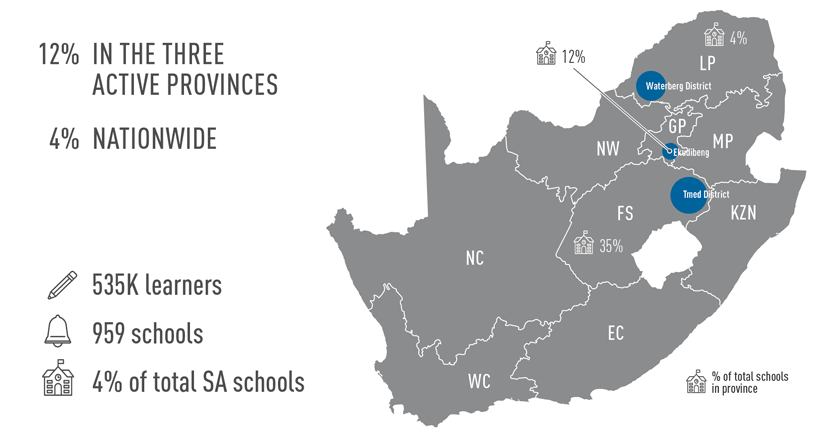When you ask Eric Siyolo Mayekiso — a teacher in the Eastern Cape of South Africa — why he became a teacher, his answer is simple: He wanted to help people. He chose this work in the hopes of making a difference in the lives of as many children as possible.
But the traditional structure of South Africa’s education system offers limited options for teachers to provide the quality instruction that can make a difference for students. And despite significant government spending and charitable investments to reform South Africa’s public schools, student performance has remained low.
At the Michael & Susan Dell Foundation, we’ve seen how educational data, when used correctly, can dramatically improve learner outcomes. With this in mind, we partnered with South Africa’s Department of Basic Education (DBE) in 2012 to help improve the outcomes of the basic education system through available, quality, and timely education data.
Our 2012 Success by Numbers report was the first output from this partnership. The report included seven practical steps for school leaders to become effective drivers of data with the goal of improving public schooling. These seven steps were the catalysts for the 2013 launch of the Data Driven Districts (DDD) program.
This program allows me to stay tapped into my school at all times, whether I’m on the school premises or not. I have 24-hour access to all the information I need to pinpoint the areas which need my attention.
Eugene Sibisi, Tswelelo Primary School Principal
The DDD program was designed to not only increase the quality of education data, but to empower education officials to use data to positively impact learners. The program itself combines two strategic elements: a data management tool and a data visualization tool.
School-level data is collected from the South African School Administration and Management System (SA-SAMS) and other sources. It’s then added to the DDD dashboard, a highly intuitive online tool that provides learner performance metrics and corresponding reports in a visual and analytical manner. The dashboard allows education officials around the country to access innovative, visual representations of real-time learner data spanning individuals, schools, districts, and provinces.
When beginning this project, the DBE envisioned a tool that was both technologically innovative and user friendly for everyone who needed to access it. Providing simple, user- friendly tools that integrate with existing schools’ processes and give users real-time feedback were key innovations that accelerated adoption.
The DDD program now provides data from more than 22,000 schools and supports teachers of 11.6 million students with tools that truly can make a difference in their students’ lives. The program now represents 95% of learner data in eight out of nine South African provinces.
Dashboards Across South Africa
10,958
Active users
11.6 M
Students
22,732
Schools
A global use case for data-driven education
The program continues to evolve based on real-time feedback, revealing which features are driving learners toward success. The data is inspiring new ways of working throughout the country. Education officials are unlocking insights that align with their specific goals and needs, providing incremental value to a variety of stakeholders in education.
Seven years after the release of Success by Numbers, we shared the 2019 follow up-report Beyond the Numbers. It showed that South Africa’s grade R-12 landscape is moving beyond diagnosing and measuring performance. The country is now a global use case for data-driven education as one of the very few countries in the world with so much near real-time time attendance and education progress data.
Although national adoption of the DDD program has built a strong data foundation, when working in complex systems with complex goals, no single solution leads to large-scale impact. Moving forward, it’s critical that we continue to have a deep understanding of the system, its people, and their needs so we can address the barriers preventing the use of data and technology. This will only further improve system performance and learner outcomes.
Timeline: Provinces in Program

Report: Beyond the Numbers
This 2019 report developed through a strategic partnership with the Department of Basic Education looks at the education data and tool landscape in South Africa, and provides seven recommendations on how school leaders can continue to be data driven.
Go Beyond the Numbers

